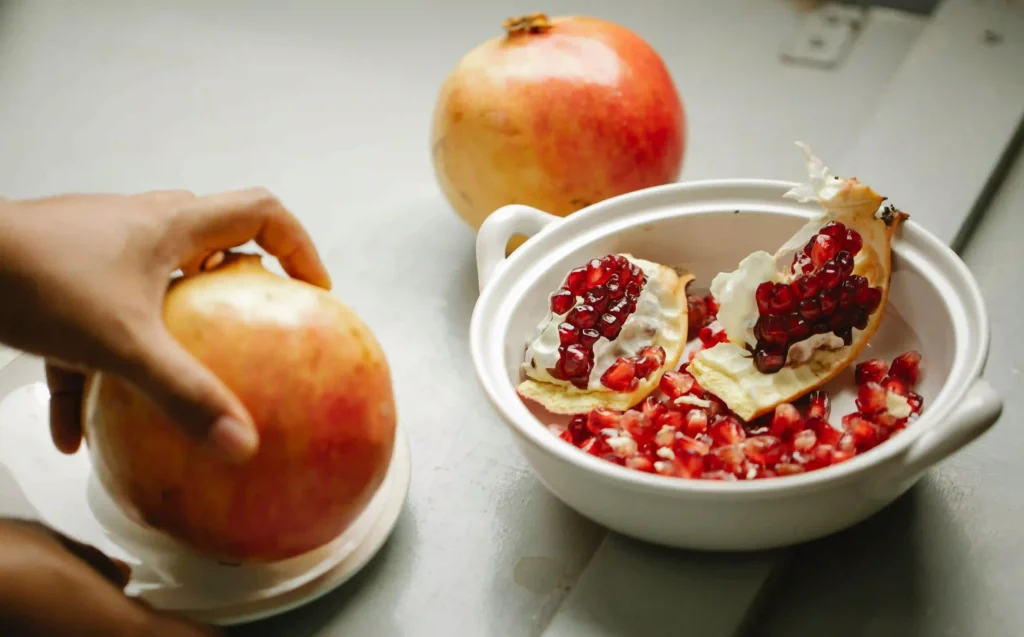Introduction

Pomegranate seeds are well recognized as a snack and a food ingredient product because of their rich nutritional value and health impacts. However, one gets worried over whether one can result to the formation of kidney stones or whether the seeds are somehow unfortunate for the kidneys. To this end, this blog explores these questions to offer understanding and answers.
Table of Contents
Can Pomegranate Seeds Cause Kidney Stones?
Pomegranate seeds do not lead to formation of kidney stones, not directly at least. Contrary to this they include beneficial compounds which were believed to put a stop to development of kidney stones and a boost on kidney health.
Kidney stones develop when such substances as calcium, oxalates or uric acid concentrate in the kidneys. The seeds of Pomegranate are free from oxalates and it is known that this compound contributes to some forms of body stones. In addition, their antioxidant composition: polyphenols will prevent oxidation – a factor associated with stone formation. Pomegranate seeds are also rich in water-soluble antiscorbutic G motion that is an incredibly important parameter in executing stones because high amounts of fluids will dissolve minerals before they can form into stones. These seeds are basically harmless and nutritious but like with anything if one exceeds their recommended portions, then it would upset the balanced diet. For the persons at the high risk of forming the kidney stones, moderation and the dietary variety becomes the password.
Are Pomegranate Seeds Safe for People with Kidney Stones?
Yes, it is okay to consume pomegranate seeds for persons with kidney stones. This caloric content may also have advantages in the preservation of renal health and in discouraging the continued formation of a calculus.
Pomegranate seeds contain potassium that helps in the regulation of affairs concerning the kidneys in particular and the entire body in general as the mineral maintains the body’s fluid balance. :As a result this assists in washing out excess minerals that may otherwise form stones. They also lower inflammation and fight oxidative stress in the kidneys as well as counter any possible harm. According to research carried out, the compounds present in the fruit stimulates the formation of the urinary biomarkers that could reduce the formation of such stones. However, persons with history of kidney stones or CKD should limit their intake and seek the advice of a healthcare provider. Moderation in the consumption and inclusion of pomegranate seeds may be enough to help out with kidney health but not directly affect the creation of kidney stones.
How Do Pomegranate Seeds Affect Kidney Health?
The seeds of pomegranate give a positive impact in kidney mainly in supplying the antioxidant, decrease inflammation and acting as a appropriate potion to rehydrate the kidney as well as the main nutrition’s like potassium.
Several phytonutrients in pomegranate seeds like ellagitannins, and flavonoids conserve the kidney tissues from certain adverse effects of oxidative stress. Our study shows that oxidative stress plays a critical role in the pathogenesis of kidney diseases and the formation of renal stones. These seeds also contain water that is highly essential to ensure proper working of the kidney and to avoid deposition of crystals in the body solutes. Another mineral in pomegranate seeds is potassium, which helps to control the filtration ratio in the human body and electrolytes balance, so important for kidneys. Moderate use daily has the potential to enhance the various renal parameters and help the body detoxify thus preventing uncontrolled chronic kidney disease and unhealthy blood pressure.
Do Pomegranate Seeds Contain Oxalates Linked to Kidney Stones?
Actually no, pomegranate seeds are not high oxalate foods which are substances related to some kinds of kidney stones.
Oxalates are naturally occurring compounds in a number of plant foods, however, foods high in oxalic acid should be avoided by individuals prone to kidney stones. Pomegranate seeds have little or no oxalates depending on how they are eaten and are generally safe for most people. There are no results found on pomegranate seeds are rich in oxalates, but it is very low in it Besides vitamin A, they are rich in vitamin C which is very crucial in the maintenance of kidneys and magnesium too. The seed have anti-inflammatory effects and prevent kidney ailments and thus its addition in diet would be safe and healthy. Pomegranate seeds are 88% water so that ensure the body is well hydrated through the consumption of this fruit reduces the chances of formation of kidney stones as it dilutes urine and reduces minerals deposits. The consumption of these seeds in reasonable servings do not constitute a hazard to the formation of renal calculi.
Can Regular Consumption of Pomegranate Seeds Lead to Kidney Stones?
No, daily intake of the fruit seeds does not cause kidney stones. In fact, they include certain compounds that might prevent the occurrence of kidney stones given that they can help the kidneys function properly by encouraging increased water intake.
Kidney stones are developed in the kidneys where some vital minerals and compounds like calcium or oxalates accumulate. Pomegranate seeds contain low amount of oxalates thus there is low formation of the stones. Their polyphenol antioxidants help defend against oxidative stress – a factor in kidney stone formation. In addition, due to their high-water content, pomegranate seeds help meet the daily water intake that is beneficial for removing extra minerals from the kidneys. It is for this reason that taking small quantities of pomegranate seeds in moderation poses no any harm to the kidneys, but the other hand, offer nutritive essentials such as potassium and magnesium which are vital for healthy kidneys.
Is Pomegranate Juice Better Than Seeds for Preventing Kidney Stones?

Both pomegranate juice and seeds should be consumed to prevent kidney stones. Juice gives the children water-soluble vitamins and antioxidants, whereas seeds give the children more fiber and nutrients. Both are useful when taken within the recommended portions for the day.
Pomegranate juice contains naturally occurring active components such as ellagic acid and polyphenols that help decrease oxidative load and inflammation of the kidneys. It is also played as an osmotic agent to increase urine volume in order to reduce formation of mineral crystals. While the hulls contain phytic acids that are not good for metabolic health in general and the kidneys in particular, the seeds contain dietary fiber. They also include natural soluble material such as potassium which plays a function in the correct balance of electrolyte. This is in comparison to a juice which is more potent and easier to take in higher quantities: seeds, generally speaking, have more properties than simply boosting levels of vitamin C, and they aid digestion as well. Both these foods can be eaten in conjunction with each other also they can be eaten alternatively in order to derive different types of health benefits that are provided.
What Nutrients in Pomegranate Affect Kidney Function?
Pomegranate possesses good potassium, magnesium, vitamin C and antioxidants that reduce oxidative stress and normal electrolyte balance for proper kidney function, kidney cleansing and detoxification.
Potassium is necessary for any fluid and electrolyte balance and since the kidneys use these to filter the fluids therefore the mineral is important in the fruit. The function of the mentioned mineral is to decrease the chances of formation of crystalline structures in the kidneys. Polyphenols as well as ellagic acid, are antioxidants that reduce the levels of oxidative stress on kidneys tissues. Many are aware that vitamin C has an important role for the immune system and for the elimination of toxins. These nutrients working synergistically as the following benefit the kidneys by increasing blood flow, decreasing inflammation, and increasing waste elimination. Introducing pomegranate as part of the diet will prevent kidney diseases and situation of chronic kidney diseases.
Do Pomegranate Seeds Help or Harm in Kidney Stone Prevention?
Pomegranate seeds have benefits of preventing formation of kidney stones. They are low in oxalates, hydrating and provide antioxidants which minimize the secondary factors that lead to formation of stones hence being richer in general kidney health.
The main factors which lead to kidney stones are lack of water in the body and formation of oxalates or calcium deposits. Pomegranate seeds also contain water therefore help reduce the formations of these compounds due to decrease in water present in the body. It has been observed that kidneys stones form when there is increased oxidative stress or damage in the tissues of the kidneys and their antioxidants help lower this damage. Furthermore, the seeds of pomegranate are said to contain potassium contribution to the regulation of the urinary minerals and avoiding the over accumulation of calcium. Nevertheless, the seeds are considered to be useful for the kidney, and their usage should be combined with the usage of other food products as well. Your body gets out of balance when you eat more of anything, even if it were fruits and vegetables or beneficial supplements. Include pomegranate seeds as a natural diet plan inclusion for those desiring to avoid kidney stones formation.
Are There Any Risks of Eating Pomegranate Seeds for Kidney Health?
Over all, it is acknowledged that pomegranate seeds are safer for the kidneys. However, over indulgence might mean that you take too much potassium which for those with kidney complications or those on low potassium diets might dangerous.
Pomegranate seeds are packed with nutrients, and they have lots of uses for health improvement, such as antioxidants and a reliable source of hydration. However, due to the content of potassium, which is rather high, this type of foods can be dangerous for people with certain problems with their kidneys – the organs unable to filter excessive amounts of potassium. To this, one can easily develop unsafe high quantities of potassium in the blood also called hyperkalemia. Kidney damage: Moderate intake is safe and healthy for persons with healthy kidneys. Those with issues of the kidney ought to speak to their doctors to establish appropriate portion size that they may take safely. As such, proper dosage and supervision sort to making certain the seeds aid within the enhancing of kidney health without bringing in different related threats.
Can Pomegranate Seeds Contribute to Calcium Oxalate Stone Formation?
Actually no, pomegranate seeds particularly seed membrane has a very low level of oxalic acid which does not have much role in the creation of calcium oxalate stone. But they help protect the kidneys through offering fluids and substances which inhibit the formation of stones.
Calcium oxalate stones are precipitated from oxalates in solution combining with calcium in the kidneys particularly where urine concentration of the organic compounds is high. Pomegranate seeds are low in oxalates which means that they cannot increase this process unlike other foods found to contain high oxalates. Also, the antioxidants as well as high water content assist in washing the kidneys and increase urine output to discourage the develop of kidney stones. Magnesium and potassium both are other nutrients present in the pomegranate seed which in turn helps to maintain the minerals which leads to formation of stones. It was clear from the current study that including the pomegranate seeds of the fruit as a component in the diet is a preventative factor rather than being a risk factor towards the development of the kidney stones.
How Does Pomegranate Consumption Influence Uric Acid Levels?
One can attribute the reduction in uric acid levels to polyphenols, and inflammatory mechanism, the fruit is also a natural diuretic that promotes kidney functionalities by ridding the body of excess uric acid.
High levels of uric acid in the bloodstream may cause gout or uric acid renal stones. Pomegranate has proven potential to have antioxidants that help in reducing inflammation and oxidative stress common with high uric acid production. The fruit has a diuretic effect that promotes the production of urine so as to eliminate the uric acid out-of-the-kidney. Moreover, pomegranate is rich in vitamin C that works to maintain metabolic procedures that decreases the scaling up of uric acid. Daily intake of pomegranate juice or seeds can be recommending for people, with the risk factors of uric acid related diseases, yet it must not be abused as it becomes part of their diet.
Should People with Kidney Stones Avoid Pomegranate Seeds?

Well, patients having kidney stones should not avoid pomegranate seeds at all. These seeds may also be useful in decreasing the occurrence of further stone formation by their ability to facilitate re-hydrating the kidneys and their antioxidant activity.
Risks of Kidney stones can be avoided by taking compounds found in Pomegranate seeds that are beneficial to kidneys. Their antioxidants counteract oxidative stress that may harm the kidneys and compound stone states. Also, pomegranate seed contains high water that make better urine flow, this means that regulates the dilution and expulsion of minerals commonly involved in the formation of stones. Widely known for not increasing the risk of calcium oxalate stone formation, these seeds are also low in oxalates. Nevertheless, pomegranate seeds may not be suitable for everyone suffering from some other health disorders or having certain dietary limitations to their consumption should consult a doctor. You also need to know about can Pomegranate Increase Blood or not?.
Are Pomegranate Seeds a Source of Compounds That Cause Kidney Stones?
On the contrary, pomegranate seeds contain no compounds responsible for formation of the kidney stones. The fruits are not high in oxalates and provide advantageous antioxidants and water that helps the kidneys and keep stones from forming.
Kidney stones are formed when oxalate or calcium in the body or acid such as uric acid is present in a high concentration in urine. Crunches are low in oxalates, and so pomegranate seeds do not take part in this process. However, they contain antioxidants that prevent free radical induced oxidative stress and inflammation, which may be precursor conditions to stone development in the kidney. Furthermore, the seeds make the urinary system to become diluted hence preventing the development of crystals from the urine. Their nutrient composition, in particular, potassium and magnesium, elaborate on balanced mineral concentration in the body. In fact, eating pomegranate seeds during normal day to day diet may even help in avoiding kidney stones instead of causing it.
What Role Does Hydration Play When Consuming Pomegranate Seeds?
Consuming pomegranate seeds is very important, especially when drinking water to ensure that the seeds do not expand to a point of suffering damages. They hold many fluids that support the aim of dilution of urine and solvents that can lead to formation of kidney stone.
Drinking water is very important to minimize the formation of kidney stones it also helps in keeping our kidneys healthy. Pomegranate seeds are natural source of water hence becoming good supplements that incidences of lack of water in the body. As these seeds are ingested; it is recommended that they be taken together with enough water to help the kidneys perform the function of filtering out wastes and balancing mineral levels. Hydration also helps to avoid formation of concentrated urine, a principal cause of formation of stones. Thus, sweetening the urine, pomegranate seeds work as a prelude to enhancing a cleaner renal setting. These then help in the protection of kidney tissues and when taken alongside adequate water intake, the body has a comprehensive protection of kidney health, here the antioxidant content.
Why Are Pomegranate Seeds Often Considered Kidney-Friendly?
The seeds of pomegranate contain features favorable with the kidneys because they contain antioxidants, hydrating nature and low levels of oxalates which prevent formation of kidney stones.
For a healthy kidney, there need to be an optimal water and electrolyte balance plus the protection against oxidative stress. Pomegranate seeds possess polyphenols which are antioxidant and anti-inflammatory properties able to decrease the free radicals’ effects on renal tissues. That is why stone products contain a lot of water, as well-hydrated kidneys are necessary for the removal of toxins and prevention of minerals and salts build-up which create kidney stones. In addition, due to their low oxalate content, these nuts are perfectly suitable for consumption by those worrying about calcium oxalate stones. Other nutrients including potassium in the pomegranate seed aids proper kidney and electrolyte functions. Intake of these seeds in a meal offer multiple body shield services to the kidney’s health.
Conclusion
Pomegranate seeds which are considered to be stuffed with nutrients and are believed to have numerous health advantages for the most part are not harmful to the kidneys. The bush potatoes are free of oxalates and are also endowed with antioxidants, water soluble power mineral, potassium and other nutrients that are beneficial to the kidneys. Though there is no close relationship between pomegranate seeds and formation of kidney stones, it is very important to take your eight-portioned water intake and food balance seriously. Because they possess antioxidant properties which help in decreasing oxidation stress on the kidneys while increasing the general health of kidneys, addition of them to your diet is recommended for kidney friendly diet. However, those who have other chronic renal illness or anyone with a question on their diet should seek the advice of a health care provider.
I have been exploring for a bit for any high quality articles or blog posts in this sort of area . Exploring in Yahoo I finally stumbled upon this site. Reading this information So i’m satisfied to convey that I’ve a very just right uncanny feeling I found out just what I needed. I most definitely will make certain to do not forget this website and give it a look regularly.